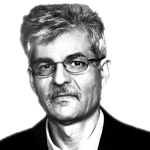
An Iraqi family waits by the roadside outside an IDP camp for civilians fleeing Mosul. PHOTO: Spencer Platt/Getty Images
Last week, the Greater Los Angeles Chapter of the United States National Committee for United Nations Women organized an event on the global day of Displacement and Belonging.
It brought together a wide spectrum of attendees: native-born Americans, first generation immigrants, second generation immigrants, migrants, human rights activists, artists, and city officials, to address the displacement crisis in both Los Angeles with its increasing homelessness, and escalating displacement elsewhere.
The Annual Assembly featured keynote speakers, Kiki Ayers Fadia Afashe, and Kenia Alococer who highlighted issues of homelessness, Syrian conflict and displacement, and gentrification from unique angles.
Ayers once a homeless young girl and now a celebrity, spoke about the power of personal initiative and determination in rising above the unfortunate circumstances.
Afshe, a Syrian artist and women’s rights activist, spoke of the multiple dimensions of the Syrian crisis and how images of the past including her friends’ drowning in “the dark sea” still haunt her. She spoke of why, as a ‘caring citizen of the world’ she wanted to cultivate a sense of belongingness through her engagement with art and activism.
Kenia Alococer, an immigrant and representative of the Poor People’s Campaign, gave an impassioned bilingual (English-Spanish) talk on the root causes of ill-treatment of undocumented immigrants, fear of deportation, and the specter of gentrification, which she attributed to unfettered capitalism.
There were also multiple discussion groups on how and why it was important to build and nurture safe places for people to have a sense of belongingness. These discussion groups, each attended by 15-30 people, addressed issues ranging from public and private physical places to common humanity, heterogeneity, and displacement.
In the 'role of creative art' discussion group, I was reminded of my uncle who left me with an enduring fascination for oral storytelling (the only kind that I came to know, since written Kurdish was forbidden in Iran). This in turn, played a part in informing my scholarly pursuits in Los Angeles, where I now call home.
In another discussion group, we discussed gentrification as a form of displacement. I brought up the global dimensions of displacement, and the specific case of Kurds as a stateless people, who faced existential threats including displacement and disappearances, mass exodus, and expulsions.
I cited Turkey as an example, and how the Turkish state has sold the “safe zone” as a humanitarian project, when it would also serve as a much needed economic boost through housing projects in areas that have been inhabited by Kurds along its borders. This is the same policy that Hafiz Al-Assad pursued in the 1970’s, in a massive displacement of Kurds, in what has come to be known as the “Arab Belt”.
The event held during the Refugees’ Week, was timely and important as displacement is one of the greatest dilemmas of this century as every other minute someone somewhere in the world is displaced.
Our world is facing a colossal crisis, violence committed against refugees and internally displaced people that we cannot turn away whether the reason be environmental, political, or cultural.
Displacement has become truly global, exponentially rising from 10 million in 1980 to 71 million in 2019. An issue that the Assembly did not address adequately is the relation between violations of human rights and different forms of displacement; from house evictions to people displaced by violence.
The discussion ranged from being sensitive to social cues in our environment to built-in social structures, concepts, developments, and policy making, all of which have to be revisited and conceptualized as Los Angeles has yet to become both physically, culturally, psychologically a place of comfort and safety for all.
The participants discussed their outlooks and visions for this reconceptualization of Los Angeles as they uncovered various forms of discriminations, particularly against women.
Dr. Soraya Fallah, A Kurdish woman from Iran, a longtime human rights activist, one of the organizers, a founder and former co-president of UNAUSA chapter, as a part of her research, addressed the different types of discriminations that Middle Eastern and North African immigrants, particularly those with disabilities experience.
She stressed the need for a broader education on cultural sensitivity towards the issue of “otherness” and acceptance as practical ways to mitigate and eliminate various forms of discrimination.
There was much more to say about belonging and displacement, but the UN Women’s event did bring “heads: “hearts” and “hands” together. We should acknowledge in particular, Cathy Hillman, the event’s main organizer, and event art curator and master of ceremony Niku Kashef, for their efforts in organizing and coordinating the Safe Cities in L.A.
|
|
Dr. Amir Sharifi is director of the Kurdish Human Rights Advocacy Group. |









Comments
Rudaw moderates all comments submitted on our website. We welcome comments which are relevant to the article and encourage further discussion about the issues that matter to you. We also welcome constructive criticism about Rudaw.
To be approved for publication, however, your comments must meet our community guidelines.
We will not tolerate the following: profanity, threats, personal attacks, vulgarity, abuse (such as sexism, racism, homophobia or xenophobia), or commercial or personal promotion.
Comments that do not meet our guidelines will be rejected. Comments are not edited – they are either approved or rejected.
Post a comment